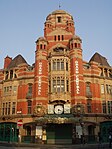Ranelagh Gardens, Liverpool
1722 establishments in EnglandAmusement park stubsMerseyside building and structure stubsParks and commons in LiverpoolPleasure gardens in England ... and 1 more
Urban public parks
Ranelegh Gardens was the first open space for public recreation to be created in Liverpool, Merseyside, England. It was opened in 1722 and was modelled on Ranelagh Gardens in Chelsea, which was at that time just outside London. It contained a formal flower garden, and a number of separate areas for the visitors to meet and socialise. There was a charge for admission, and a strict code of behaviour was imposed. Refreshments were available, and in the centre of the gardens was a fishpond containing carp, tench, and other fish. The gardens continued to be open until the late 1790s. The site is now occupied by the Adelphi Hotel.
Excerpt from the Wikipedia article Ranelagh Gardens, Liverpool (License: CC BY-SA 3.0, Authors).Ranelagh Gardens, Liverpool
Hawke Street, Liverpool Ropewalks
Geographical coordinates (GPS) Address Nearby Places Show on map
Geographical coordinates (GPS)
| Latitude | Longitude |
|---|---|
| N 53.4055 ° | E -2.9774 ° |
Address
The Adelphi
Hawke Street
L3 5GD Liverpool, Ropewalks
England, United Kingdom
Open on Google Maps









